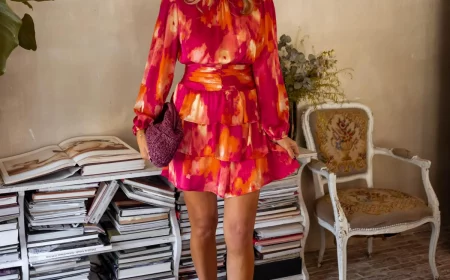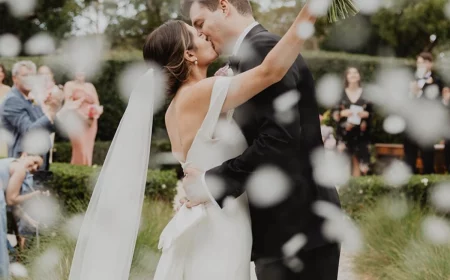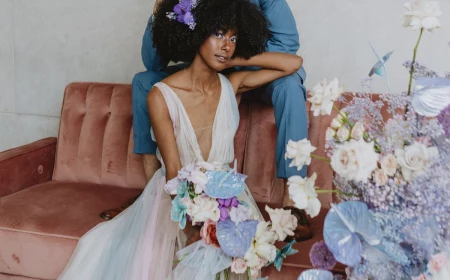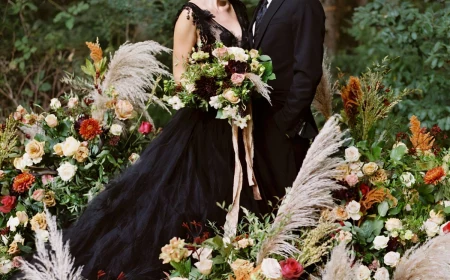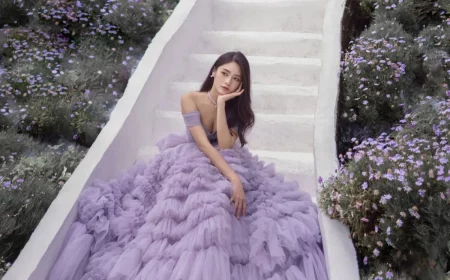The Honest Truth About Off-the-Shoulder Wedding Dresses (and How to Actually Dance in One)
In all my years as a bridal consultant and fitter, I’ve seen that same moment over and over again. A bride slips into an off-the-shoulder wedding dress, turns to the mirror, and just… lights up. There’s something so romantic about this style, right? It frames your face, shows off your collarbones, and strikes that perfect balance between elegance and just a little bit of daring.
In this article
But then, a second later, the look of concern creeps in. I can see it in their eyes. They start nervously pulling at the sleeves and ask the million-dollar questions: “How on earth does this stay up?” and “Will I even be able to dance?”
Those are exactly the right questions to be asking. The real magic of a perfect off-the-shoulder gown isn’t just how it looks, but in its hidden engineering. A great dress in this style should feel totally secure, letting you celebrate without constantly yanking it back into place. It’s a mix of art and, honestly, a bit of physics. Too often, brides are sold on a pretty picture without getting the practical truth. My job is to give you that truth, so let’s talk about what really makes this style work.

How It Really Stays Up: It’s Not the Sleeves!
Let’s get one thing straight right away: the sleeves on an off-the-shoulder dress are liars. They are purely for decoration and provide zero support. I repeat, ZERO support. If a dress is relying on tight arm bands to stay in place, it’s a sign of poor design or a bad fit, and it’s a recipe for a very uncomfortable day with seriously restricted movement.
So, where does the support come from? It all happens on the inside. The secret is a well-built bodice that acts like a high-performance piece of architecture for your body. Next time you’re in a shop, be a bridal detective. Ask to see the inside of an off-the-shoulder gown and try to spot these key features:
1. Good Boning: This is the skeleton of the dress. Boning is made of rigid strips sewn into channels inside the bodice to give it shape and keep it from collapsing. You’ll usually find two types:

- Steel Boning: This is the gold standard, typically found in higher-end gowns. It’s incredibly strong but also flexible, and it even molds to your body heat for a custom-feeling fit. It offers amazing support.
- Plastic (Synthetic) Boning: This is way more common and budget-friendly. It definitely works, but it can be more rigid and might even warp or bend out of shape if you’re, say, busting a move on the dance floor. For a dress with a heavy skirt, plastic boning might not be up to the task.
2. The Waist Stay (Your Secret Weapon): Oh yeah, this is the most critical part, and it’s so often overlooked. A waist stay is a sturdy ribbon band, about an inch wide, that’s sewn into the dress right at your natural waist. You fasten it with a separate set of hooks and eyes before you zip up the dress. This little band anchors the entire weight of the gown to your waist—not your bust or shoulders. It’s an absolute game-changer. The dress hangs from your waist, which means the bodice doesn’t have to be uncomfortably tight up top to stay put.

3. A Solid Foundation: The pretty outer fabric needs a strong lining. The inside of the bodice should be made from a stable, non-stretch material like cotton coutil or a strong satin. This lining is what holds the boning and does all the hard work, so the delicate lace or crepe on the outside can just focus on looking beautiful.
The Fitting Process: Where the Magic Happens
Let’s be real: the sample gown you try on in the store will almost never fit perfectly. The success of an off-the-shoulder style is almost 100% dependent on the skill of your alterations specialist. A great fitter makes the dress feel like it was literally sculpted for your body.
Finding a Pro Who Gets It
Before you trust someone with your dream dress, you need to know if they really understand the unique challenges of this style. Don’t be shy—ask them a few specific questions to vet their experience:

- “How do you typically approach alterations for an off-the-shoulder gown to ensure it’s secure?”
- “Have you ever added an internal waist stay to a dress before?” (If they look confused, that’s a red flag!)
- “What are your techniques for improving arm mobility without compromising the look of the sleeve?”
Their answers will tell you everything you need to know about their expertise.
Your Fitting Timeline & Checklist
So, when does all this happen? Plan to schedule your first fitting about 8 to 12 weeks before your wedding. This gives you and your seamstress a comfortable cushion for the 2-3 fittings you’ll likely need. The final fitting should be just a week or two before the big day to account for any minor fluctuations.
And please, please, please… here’s what you need to bring to that first fitting:
- Your Shoes! The exact pair you’ll be wearing. The heel height is critical for getting the hemline just right.
- Your Undergarments! This is non-negotiable. What you wear underneath is part of the dress’s structure. For this style, a quality longline strapless bra or bustier can be a lifesaver. I often recommend brands like Va Bien or Dominique because their pieces have fantastic boning and support. Sometimes, we decide to sew cups directly into the gown, which works great if you don’t need a ton of lift. This is a decision you and your fitter will make together.
A common problem I see is what I call “T-Rex arms,” where a bride can’t lift her arms. This is usually from sleeves that are too tight. A skilled seamstress can often add a hidden panel of fabric (a gusset) in the underarm to give you more mobility. It’s an amazing trick! Heads up, this kind of technical fix usually costs between $50 and $100, but it’s worth every penny to be able to hug your new spouse properly.

Speaking of costs, if your dress doesn’t have a waist stay, I almost always insist on adding one. Expect that alteration to be in the $75 to $150 range. Trust me, it’s the best money you’ll spend on your dress for all-day comfort and security.
Let’s Talk Fabrics
The material of your gown does more than just look pretty—it completely dictates how the off-the-shoulder style will feel and behave. There are no tables or charts for this in real life, you just have to know the vibe.
For That Clean, Structured Look
If you love a sharp, architectural neckline, you’ll want a fabric with some guts.
• Silk Mikado: This is a heavy-duty silk blend with a gorgeous matte finish. It’s crisp and holds its shape, making it perfect for those bold, folded-over necklines. It’s a bit heavy, but it resists wrinkles like a champ.
• Crepe: A hugely popular choice for modern, minimalist gowns. Good crepe has a beautiful, fluid drape, but it’s still substantial. But here’s the honest truth about crepe: it’s brutally honest. It shows every single line and curve, so the tailoring has to be absolutely flawless.

• Structured Satin: Think duchesse satin. It has a rich sheen and a firm structure that supports itself beautifully. It’s a classic for a reason and gives off a very formal, luxurious vibe.
For a Soft, Romantic Vibe
If you’re dreaming of something more ethereal and floaty, these are your go-tos.
• Lace: The type of lace makes all the difference. Delicate Chantilly lace is feather-light and perfect for soft, sheer sleeves. Heavier Alençon or Guipure lace has more texture and works better for appliqués than for a fully draped sleeve, which can get heavy.
• Tulle: English net or silk tulle is incredibly soft and creates dreamy, wraith-like sleeves that feel amazing against the skin. Just a heads-up, the standard nylon tulle can be a bit stiffer and sometimes scratchy, though it’s great for adding volume.
• Chiffon or Organza: Silk chiffon is soft, matte, and drapes like a dream, perfect for Grecian-style sleeves. It’s incredibly romantic! Just know that it’s also very delicate and can snag easily. Silk organza is a bit crisper and creates a more airy, voluminous sleeve.

The Honest Truth: What It’s Really Like to Wear
Okay, let’s have a frank conversation. I believe in total transparency because I want you to feel amazing on your wedding day, not disappointed.
Your range of motion will be limited. I’m sorry, but it’s true. Even in the best-fitting off-the-shoulder gown, you won’t be able to raise your arms straight over your head to do the “YMCA” dance. That’s just the physics of having a band of fabric wrapped around your arms. You’ll learn the art of the lean-in hug. It’s a trade-off for that killer neckline.
Practice makes perfect. Once your alterations are done, wear your dress around the house for an hour. Practice sitting, walking, and giving a few hugs. Get a feel for its limitations so they feel normal on the big day.
By the way, a little trick for extra peace of mind is to have your fitter sew a thin strip of silicone gripper elastic along the inside top edge of the bodice. It adds a bit of friction against your skin. It’s a helper, not a cure for a bad fit, but it can be a great confidence booster.

Choosing an off-the-shoulder dress is a fantastic decision. The style is timelessly beautiful. But by arming yourself with this insider info, you go from just a shopper to an informed buyer. You learn to see beyond the showroom sparkle to find a gown that’s not just stunning, but also brilliantly engineered to make you feel secure and incredible all day long.
Inspirational Gallery


The ultimate hairstyle dilemma with an open neckline?
A low, romantic chignon is a classic choice, as it leaves the collarbones completely clear, celebrating the dress’s design. For a more bohemian vibe, consider soft, cascading waves swept to one side. The key is balance: you want to frame the face without hiding the stunning neckline you chose.


The Hug Test: During your fitting, don’t just stand still. Give your mom or maid of honor a full, proper hug. Can you raise your arms comfortably without the whole bodice shifting? If not, talk to your seamstress. A small elastic connector, subtly hidden under the arm, can sometimes be added to provide a touch more give without compromising the look.


- A clean, unadorned neckline lets the silhouette speak for itself.
- A delicate lace trim along the edge adds a touch of classic romance.
- Cascading 3D floral appliqués on the sleeves create a whimsical, garden-party feel.
The detail on the edge of your neckline sets the entire mood of the gown.


Thinking about jewelry? An off-the-shoulder neckline creates a beautiful, open canvas. Here’s how to accessorize it:
- Statement Earrings: With the neck and shoulders exposed, a pair of dramatic drop or chandelier earrings can be the perfect focal point.
- Delicate Lariat Necklace: A simple ‘Y’ shaped necklace can draw the eye downward, subtly enhancing the line of the décolletage.
- Bare is Beautiful: Sometimes, the most powerful statement is no necklace at all, letting your glowing skin and the dress’s architecture be the main event.

Fabric choice dramatically changes the sleeve’s behavior. A structured material like Mikado or heavy satin will create a crisp, architectural fold, as seen in many Pronovias designs. In contrast, sleeves made of soft English netting or silk tulle will drape and float ethereally, offering a more delicate, romantic look favored by designers like Monique Lhuillier.


Detachable Sleeves: These offer a brilliant two-in-one look. You get the romance of an off-the-shoulder gown for the ceremony and photos, then simply un-pop them for a strapless reception dress that allows for total freedom on the dance floor.
Integrated Sleeves: These are part of the gown’s core design, meaning the lines are seamless and the structure is often more robust. The look is cohesive and intentional, but your range of motion will be slightly more limited.


According to a survey by The Knot, over 90% of brides have their wedding dress altered.
For an off-the-shoulder dress, this isn’t just about hemming the length. A skilled seamstress is non-negotiable. She will mold the inner bodice to your exact shape, ensuring it’s the corset doing the work, not the sleeves, so you can breathe, hug, and toast without a single worry.


Don’t overlook your back. This neckline creates a gorgeous, wide frame that beautifully showcases the back of the dress. Whether it’s a deep V, a row of delicate buttons, or an intricate illusion lace panel, make sure your photographer captures some shots from behind. It’s a surprisingly stunning and often-forgotten angle.


Wondering about undergarments?
The best off-the-shoulder gowns have all the support built right in. But if you desire extra shaping or lift, the key is a low-back bustier. Brands like Va Bien or Dominique offer specialized bridal lingerie that fastens low on your back and provides seamless support from the waist up, remaining completely invisible.

The secret to rocking this style with total confidence lies in your posture. Stand up tall, roll your shoulders back and down, and elongate your neck. This not only prevents the dress from slipping but also showcases the neckline to its best effect, creating a long, elegant line from your earlobe to your shoulder.


- Double-Sided Fashion Tape: The number one essential. A small piece like Toupee Tape can help keep a draped sleeve perfectly in place against your skin.
- Blister Stick: To prevent any potential rubbing under the arms.
- Mini Deodorant/Antiperspirant: For a quick refresh to stay comfortable and confident.


Trend Alert: The Puffy Sleeve. The off-the-shoulder look is getting a dose of drama with voluminous, cloud-like sleeves. From short, puffed cap sleeves to full-length bishop sleeves that gather at the wrist, this trend adds a touch of fairytale romance and high-fashion flair. Look to designers like Galia Lahav for inspiration.


An off-the-shoulder dress is perfectly appropriate for most religious ceremonies. For added modesty, consider a style with elegant long lace sleeves. Another beautiful option is to pair your gown with a cathedral-length veil, which can be draped over your shoulders for the ceremony, providing coverage without hiding the dress’s design.


While the style has roots in the Victorian era, it was actress Brigitte Bardot in the 1950s and 60s who cemented the off-the-shoulder look as a symbol of effortless, sun-kissed glamour.

The secret to a flawless glow? Proper skin prep. The week before your wedding, gently exfoliate your shoulders, décolletage, and back. On the day, apply a moisturizer with a subtle luminizer, like Fenty Beauty’s Body Sauce, to catch the light beautifully in photos and in person.


- Move with grace and confidence on your big day.
- Enjoy every hug without worrying about wardrobe malfunctions.
The key? A perfectly fitted internal corset. It’s the hidden hero that provides all the structure, allowing the delicate sleeves to be purely decorative and letting you focus on the moment.


Can you wear a veil with this neckline?
Absolutely! The placement is key. Tucking the comb of a sheer, simple veil at the base of a low updo allows the fabric to cascade down your back without cluttering the neckline. A birdcage veil can also be a chic, vintage-inspired choice that complements the open space beautifully.


During your dress search, you’ll encounter different sleeve styles. Draped ‘swags’ of fabric that connect at the front and back of the bodice offer a very Grecian, romantic feel. In contrast, ‘band’ sleeves form a complete circle around the arm, providing a more structured and secure (though sometimes more restrictive) fit. Try on both to see which feels best.


A 2021 study revealed that personalized and convertible elements are a top priority for modern brides.
This is why detachable off-the-shoulder sleeves have become so popular. They respond directly to the desire for a transformative look, taking a bride from formal ceremony elegance to party-ready freedom without a full dress change.

Expert Tip: When you try on a gown, consciously drop your arms to your sides and let them hang naturally. Do the sleeves dig in or feel uncomfortably tight? While they should be snug, they should never pinch or restrict blood flow. Remember, you’ll be wearing this for 8+ hours!


Some of the most iconic royal and celebrity wedding gowns have featured this neckline. Think Meghan Markle’s minimalist Givenchy ceremony gown for a modern, elegant take, or Sofia Richie’s Chanel dress with its delicate scalloped lace edge for a timeless romantic feel. It’s a silhouette that is truly fit for a queen.


When posing for photos, slightly angle your body to the camera, turn your head towards the lens, and gently push your shoulder forward on the side closest to the camera. This simple trick elongates the neck and fully displays the beautiful line of the dress, creating a sophisticated, editorial-style shot.


Off-the-Shoulder: The sleeve or strap begins on the outer edge of your shoulder, creating a wide, horizontal line that exposes both shoulders completely.
Cold-Shoulder: This style features a strap on the shoulder, with a cutout that exposes only the top of your arm. It offers more support and a different, more casual aesthetic.
After the big day, proper storage is crucial. Don’t hang an off-the-shoulder gown by the sleeves, even if they have hanger loops! This can stretch and damage them over time. The dress should be supported by sturdy hanger loops sewn inside the bodice, or carefully folded and stored in a pH-neutral archival box.


